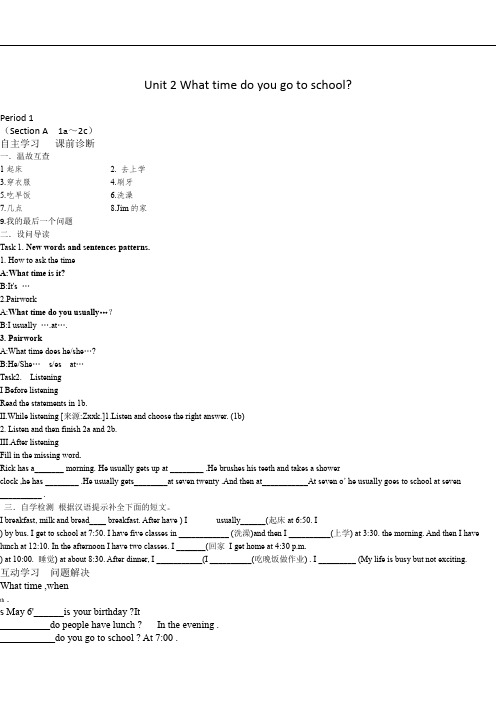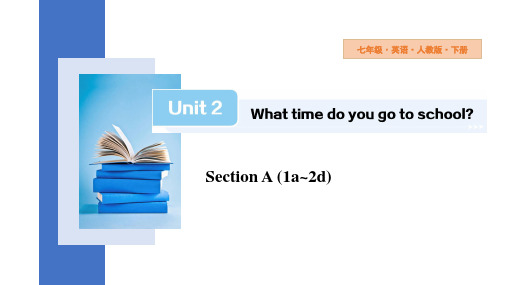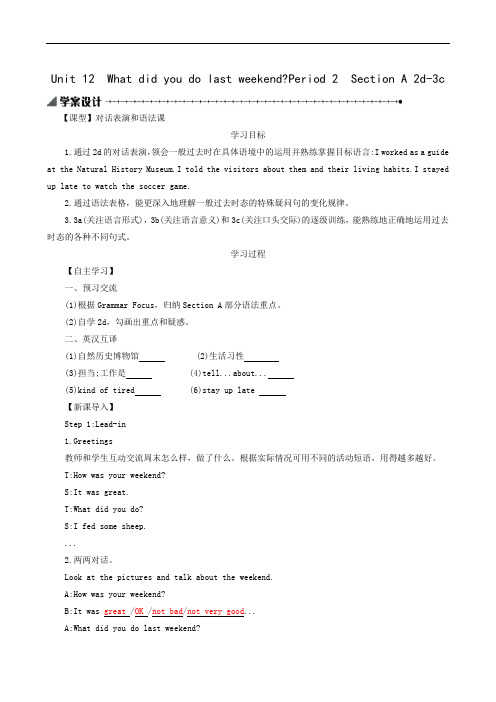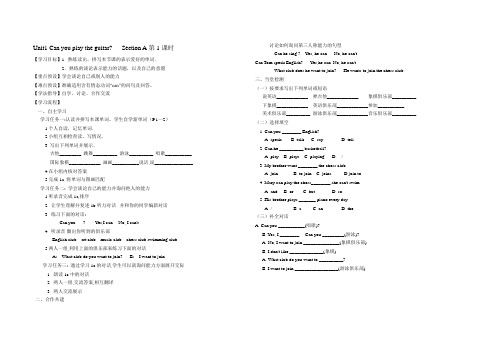7年级英语下导练循环教学案unit2 SectionA
人教版七年级英语下册教案 Unit 2 单元导学

Unit2 Whattimedoyougotoschool?
1.本单元话题以“日常生活习惯”展开,情境属于新课标“人与自我”主题范畴中的“生活与学习”和“做人与做事”这两个主题群,涉及子主题“丰富、充实、积极向上的生活”和“自我认识,自我管理,自我提升”。
2.单元主题体现《中国学生发展核心素养》中的“自主发展”方面,提升学生的“健康生活”这一素养,立足于“自我管理”这一基本要点。
3.学会英语时间的表达方式以及相关的词汇。
4.能通过听录音材料获取有关时间表达的信息。
5.能运用whattime 和when 引导的特殊疑问句询问时间。
6.能运用频度副词谈论日常作息习惯,培养合理安排作息时间的意识。
续表
【课时建议】本单元建议5课时
SectionA(1a-1c)(一课时)
SectionA(2a-2d)(一课时)
SectionA(GrammarFocus-3c)(一课时)
SectionB(1a-1e)(一课时)
SectionB(2a-SelfCheck)(一课时)
词汇短语:主要采用图片及多媒体展示助记法。
基本句子:采用多媒体展示及交际法(利用多媒体展示两人进行交际时的情景)。
语法:主要通过交际、练习让学生掌握学会问答作息时间。
人教版七年级下册英语导学案Unit 2 What time do you go to school

Unit 2 What time do you go to school? Period 1(Section A 1a~2c)自主学习课前诊断一.温故互查1起床 2. 去上学3.穿衣服4.刷牙5.吃早饭6.洗澡7.几点8.Jim的家9.我的最后一个问题二.设问导读Task 1. New words and sentences patterns.1. How to ask the timeA:What time is it?B:It's …2.PairworkA:What time do you usually…?B:I usually ….at….3. PairworkA:What time does he/she…?B:He/She…s/es at…Task2. ListeningI Before listeningRead the statements in 1b.II.While listening [来源:Zxxk.]1.Listen and choose the right answer. (1b) 2. Listen and then finish 2a and 2b.III.After listeningFill in the missing word.Rick has a_______ morning. He usually gets up at ________ .He brushes his teeth and takes a shower clock ,he has ________ .He usually gets________at seven twenty .And then at___________At seven o'he usually goes to school at seven __________ .三.自学检测根据汉语提示补全下面的短文。
Unit2SectionA(1a2d)课件初中英语人教版新目标七年级下册

ADEFCB
顺序:_________
2.听2a录音,回答问题。
(1)How many brothers does Jim have?
Two.
(2)How many showers (淋浴器) do they have?____________
Only one.
(3)Is it difficult
for them to take a shower?
注意第三人称单数的正确使用。
Time People
You
Your
friend
Your
father
Your
mother
get up
6:00
6:10
5:50
5:30
get dressed
6:30
6:40
6:20
6:00
brush teeth
6:40
6:50
6:30
6:05
eat breakfast
6:50
七年级·英语·人教版·下册
Section A (1a~2d)
单元话题
日常活动
教材分析
在本单元中,学生主要学习用when和what time引导特殊疑
问句询问时间的表达方式;学习表示频率的副词。通过本单元
的学习,学生学会合理安排自己的日常活动,并且能够了解和转
述他人的日常生活安排。
Section A(1a~2d)通过活动名称与图中时间的配对,引出本
thirty .
B:It’s six
__________
A:What time do you usually get up?
get up at six thirty .
人教版七年级英语下册同步导学案unit12 period2 sectiona2d--3c

Unit 12 What did you do last weekend?Period 2 Section A 2d-3c【课型】对话表演和语法课学习目标1.通过2d的对话表演,领会一般过去时在具体语境中的运用并熟练掌握目标语言:I worked as a guide at the Natural History Museum.I told the visitors about them and their living habits.I stayed up late to watch the soccer game.2.通过语法表格,能更深入地理解一般过去时态的特殊疑问句的变化规律。
3.3a(关注语言形式),3b(关注语言意义)和3c(关注口头交际)的逐级训练,能熟练地正确地运用过去时态的各种不同句式。
学习过程【自主学习】一、预习交流(1)根据Grammar Focus,归纳Section A部分语法重点。
(2)自学2d,勾画出重点和疑惑。
二、英汉互译(1)自然历史博物馆 (2)生活习性(3)担当;工作是(4)tell...about...(5)kind of tired(6)stay up late【新课导入】Step 1:Lead-in1.Greetings教师和学生互动交流周末怎么样,做了什么。
根据实际情况可用不同的活动短语,用得越多越好。
T:How was your weekend?S:It was great.T:What did you do?S:I fed some sheep....2.两两对话。
Look at the pictures and talk about the weekend.A:How was your weekend?B:It was great /OK /not bad/not very good...A:What did you do last weekend?B:...【新知呈现】Step 2:Presentation1.看图片,Lisa和Paul正在谈论他们的周末活动。
七年级英语下册导学案(全套)

Unit1 Can you play the guitar? Section A第1课时【学习目标】1. 熟练读出,拼写本节课的表示爱好的单词.2.熟练的谈论表示能力的话题,以及自己的意愿【重点预设】学会谈论自己或别人的能力.【难点预设】准确适用含有情态动词“can”的问句及回答。
【学法指导】自学、讨论、合作交流【学习流程】一、自主学习学习任务一:认读并拼写本课单词。
学生自学新单词(P.1—2)1.个人自读,记忆单词.2.小组互相检查读、写情况.3 .写出下列单词并展示.吉他_________ 跳舞__________ 游泳__________ 唱歌___________国际象棋_____________ 画画___________说话,说________________4.在小组内核对答案.5.完成1a 将单词与图画匹配.学习任务二: 学会谈论自己的能力并询问他人的能力.1.听录音完成1a,排序2. 让学生理解并复述1b听力对话. 并和你的同学编新对话.3. 练习下面的对话:Can you ----? Yes,I can. No, I can't. .4. 听录音.圈出你听到的俱乐部English club art club music club chess club swimming club5.两人一组,利用上面的俱乐部来练习下面的对话.A: What club do you want to join? B: I want to join ---- 学习任务三: 通过学习1c的对话,学生可以就询问能力方面展开交际1. 朗读1c中的对话2. 两人一组,交流答案,相互翻译3. 两人交流展示.二、合作共建讨论如何询问第三人称能力的句型Can he sing ? Yes, he can . No, he can't.Can Tom speak English? Yes,he can. No, he can't.What club does he want to join? He wants to join the chess club.三、当堂检测(一)按要求写出下列单词或短语说英语_____________ 弹吉他_____________ 象棋俱乐部__________ 下象棋_____________ 英语俱乐部_____________参加___________美术俱乐部__________ 游泳俱乐部_____________音乐俱乐部__________ (二)选择填空1. Can you ________ English?A. speakB. talkC. sayD. tell2. Can he __________ basketball?A. playB. playsC. playingD. /3. My brother want ________ the chess club.A. joinB. to joinC. joinsD.join to4. Mary can play the chess________ she can't swim.A. andB. orC. butD. so5. His brother plays _______ piano every day.A. /B. aC. anD. the(三)补全对话A. Can you ___________(唱歌)?B. Yes, I ________. Can you _________(游泳)?A. No, I want to join _______________(象棋俱乐部).B. I don't like ______________(象棋)A. What club do you want to __________?B. I want to join __________________(游泳俱乐部)Unit1 Can you play the guitar? Section A第2课时【学习目标】.掌握并运用各种俱乐部的短语。
仁爱英语七年级下册Unit7 Topic 2 Section A教案新部编本

教师学科教案[ 20 – 20 学年度第__学期]任教学科:_____________任教年级:_____________任教老师:_____________xx市实验学校仁爱英语七年级下册Unit7 Topic 2Section A教案The main activities are 1a and 3.本课重点活动是1a和3。
Ⅰ. Teaching aims and demands 教学目标1. Learn some useful words and expressions:take photos,row, skate2. Learn "can" and "can’t" for ability and inability:(1)—Can you sing Chinese songs at Kangkang’s birthday party?—Yes, I can.(2)—Can you play the guitar?—No, I can’t.(3)—Can you dance?—Yes, I can.(4)—Can you take photos?—Yes, I can.(5)I can’t sing any Chinese songs.Ⅱ. Teaching aids 教具实物/卡片/挂图/录音机Ⅲ. Five-finger Teaching plan 五指教学方案Step 1 Review 第一步复习(时间: 10分钟)1.(让学生以小组为单位,复习以前学过的动词短语。
)(学生四人为一小组,列出已学过的动词短语,看哪一小组写得最多。
) T: Work in groups. Write as many verb phrases as you can. Let’ s see which group can write the most phrases. One phrase one point.Now, let’s begin.(每组写完后,派一个代表向全班同学汇报,然后老师把这些词组板书在黑板上。
仁爱版七年级英语下册Unit7Topic2SectionA教学设计
四、教学内容与过程
(一)导入新课
1.教师通过展示一组志愿者活动的图片,如:为贫困儿童筹集物资、为环境保护植树等,引导学生观察并思考这些活动的意义。
2.邀请学生分享他们了解的志愿者活动,以及他们对于志愿者活动的看法。
3.引入本节课的主题:“How can we help others?”,激发学生的学习兴趣,为新课的学习做好铺垫。
(二)讲授新知
1.教师呈现教材中的对话,引导学生听录音并跟读,让学生感受语音、语调,培养良好的发音习惯。
2.对对话中的重点词汇和句型进行讲解,如:volunteer, charity, raise, collect等,以及一般现在时和一般过去时的用法。
3.通过示例和练习,让学生掌握情态动词can和may的用法,并能运用到实际对话中。
教学策略:采用情境教学法,让学生在真实语境中学习英语,提高他们的语言运用能力。
2.互动交流:组织学生进行小组讨论,分享自己或他人做志愿者的经历,促进与课堂活动,提高口语表达能力。
3.语法讲解:结合教材内容,详细讲解一般现在时和一般过去时的用法,以及情态动词can和may的用法。
3.培养学生的公民意识,让他们明白自己作为一名社会成员,应该关心社会、参与社会公益活动。
4.激发学生学习英语的兴趣,让他们在轻松愉快的氛围中学习英语,提高学习效果。
二、学情分析
在本章节的教学中,考虑到七年级学生的年龄特点和英语学习水平,特进行以下学情分析:
1.学生年龄:七年级学生正处于青春期,他们对新鲜事物充满好奇,具有较强的求知欲和表现欲。在此阶段,引导学生关注社会问题,培养他们的爱心和责任感具有重要意义。
5.阅读拓展:推荐学生阅读一篇关于志愿者活动的英文文章,提高阅读理解能力,了解不同文化背景下的志愿者活动。
2020-2021学年人教版英语七年级下册Unit2SectionB2a—2c教案
此外,学生在听力练习中的表现也有所差异。一些学生在听力过程中难以捕捉到关键信息,导致理解困难。为了提高学生的听力理解能力,我计划在教学中加入更多听力技巧的指导,如预测、关键词定位等,帮助学生更好地应对听力挑战。
(1)词汇:本节课的核心词汇包括library, floor, hall, office, garden等,这些词汇是描述学校场所的基础词汇,教师需重点讲解并让学生熟练掌握。
(2)句型:教学重点句型为“Where is the ...?”和“Is the ... near ...?”,这两个句型是询问和描述地点的关键句型,教师应引导学生在实际场景中灵活运用。
2.实验操作:为了加深理解,我们将进行角色扮演活动。每组学生模拟在不同地点询问和回答问题,运用所学词汇和句型。
3.成果展示:每个小组将向全班展示他们的讨论成果和角色扮演活动。
(四)学生小组讨论(用时10分钟)
1.讨论主题:学生将围绕“如何在实际生活中运用所学知识询问和描述地点”这一主题展开讨论。他们将被鼓励提出自己的观点和想法,并与其他小组成员进行交流。
四、教学流程
(一)导入新课(用时5分钟)
同学们,今天我们将要学习的是《Unit2 Section B 2a—2c》这一章节。在开始之前,我想先问大家一个问题:“你们在日常生活中是否遇到过找不到某个地方的情况?”(例如:在图书馆找不到阅览室)这个问题与我们将要学习的内容密切相关。通过这个问题,我希望能够引起大家的兴趣和好奇心,让我们一同探索如何用英语询问和描述地点的奥秘。
七年级英语下册Unit2导学案新部编可用
优选授课授课设计设计 | Excellent teaching plan教师学科授课设计[ 20–20学年度第__学期]任授课科: _____________任教年级: _____________任教老师: _____________xx市实验学校育人仿佛春风化雨,授业不惜蜡炬成灰优选授课授课设计设计| Excellent teaching plan南营中学七年级英语下册Unit2 导教学设计主备人 : 王婷婷一、:《 Unit 2 Where's the post office ?》二、学目:1、学和掌握: post office , library , restaurant⋯2、学会路和指路的基本句型1)---Is there ⋯ ? –Yes , there is . / No, there isn’t.2)There is a bank on the Fifth Avenue .3)The pay phone is next to the library .3、掌握地址介的用法三、自主学1、地址名① 局② ③ ④ 行⑤公园⑥超市⑦餐⑧投式公用式2、介①在⋯ 面②在⋯前面③在⋯后边④ 在⋯周边⑤在⋯上面⑥在⋯里面⑦在⋯下面⑧ 靠着⋯⑨在⋯和⋯之3、短①在局面②在商场和行之③ 在第五大街④在学校后边⑤在周边⑥in front of the library4、句型 . ①--周边有行? --不,没有。
②周边有超市 ? 是的 ,有.③公用在局和之。
四.合作研究1.你知道 there be 和 have 有什么不同样?There be ⋯句型在某个地方有某物/某人1.There _____ a bank in front of the library2.There _____ 8 libraries in our city .3.There _____ a pen and 2 rulers on the desk(.there be就近原)4.There _____ 2 rulers and a pen on the desk⋯have / has ⋯某人有某物1.We ___ a big library in our school2.Nancy ___ a pen on her desk: 用适合的 be 填空 .1.There ____ a pen near the ruler.2.There ____ a pen near the ruler.育人仿佛春风化雨,授业不惜蜡炬成灰优选授课授课设计设计| Excellent teaching plan3.There ____ a pen and two books on the table.4.There ____ 2 books and a pen on the table.用 have, has, there is, there are填空1.My brother_____ many books.2._______ a bank on Bridge Street.3._______ many books on the desk.4. I ______ many friends, and he _____one.5. _______some supermarkets in the city.6.My uncle _____ a VCD.7. ______54 students in Class 3.8._____ your father ____ a watch?9.我校有两个图书馆.________two libraries in our school .Our school ______ two libraries .四、目标检测1、图书馆在哪 ?在学校后边.2、这周边有一个商场吗 ?有,在餐馆对面 .3、这儿有一个银行吗 ?4. 邮局在公园和投币式电话之间.育人仿佛春风化雨,授业不惜蜡炬成灰。
人教七年级下Unit 2 (Section B 1a-1e) 导学案设计
人教新目标Go for it!(7B) Unit 2 What time do you go to school?第三课时Section B (1a—1e) 导学案I. 知识目标词汇和短语(熟背):half, past, quarter, homework, do (one’s) homework, run, clean, walk, take a walk 重点句式(掌握用法和含义):时间表达法II. 教学步骤Task 1 谈谈你在生活中总是做的事、经常做的事和从不做的事。
频率副词:always>usually=often>sometimes>seldom>never位置:be、助动词后实意动词前。
e.g.: I usually get up at six o’clock.I am always good with the old men.always: _____________________________________________usually: _____________________________________________never: ______________________________________________Task 2试着用half;quarter表达下列时间:6: 30 A.M. : _____________________________________________7: 45 A.M. : _____________________________________________9: 15 P.M. : _____________________________________________4: 30 P.M. : _____________________________________________答案:half past six a.m.;a quarter to eight a.m.a quarter past nine p.m.;half past four p.m.Task 3 根据图片写出下列活动。
- 1、下载文档前请自行甄别文档内容的完整性,平台不提供额外的编辑、内容补充、找答案等附加服务。
- 2、"仅部分预览"的文档,不可在线预览部分如存在完整性等问题,可反馈申请退款(可完整预览的文档不适用该条件!)。
- 3、如文档侵犯您的权益,请联系客服反馈,我们会尽快为您处理(人工客服工作时间:9:00-18:30)。
1
七年级英语导练循环教学案
授课人: 编号: 2 总课时:06
学科 英语 主备人 时
间
3.4 课型 新授 审核人
课
题
Unit 2 What time do you go to school?
Section A 2d-3c
教
学
目
标
1. Learning goals
(1)New vocabulary:
never, early, fifty, job, work, station, radio station, o’clock , night
funny, exercise, on weekends, best, group
(2)Target language:
--He works at a radio station.
--That’s a funny time for breakfast!
--After that, I usually exercise at about ten twenty.
--I’m never late for work.
(3)Writing practice.
Enable the Ss to write down the key sentences correctly.
(4)To train students’ communicative competence.
2. Method Objects in Teaching
(1)Enable the Ss to form a correct attitude to study.
(2)To understand the target language by reading and listening .
3. Sensibility and Value
To enable to ask for the time and communicate with others.
重、
难
点
Talk about how to ask time and answer it correctly.
2
感 悟 导 入 Ask the Ss to translate the following sentences. 1. 你的电台节目是什么时间?
2. 从晚上12点到早晨6点。
3. 那个吃早饭的时间真有意思。
4. 我通常大约在10点20锻炼。
5. 我上班从来不迟到。
自
主
探
究
Step Ⅰ Review the sentences that we’ve learned in last section.
Step II Post-listening Activities
2c1 Listen to the tape and repeat.
2c2 Talk about yourself and put the conversation into Chinese.
2d Role-play the conversation in pairs, then perform it to the whole class.
StepⅢ Exercises
3a Write answers or questions and use always, usually, or never.
3b /3c Interview three of your classmates. Find out what time they do
these activities . Then give a report to the class.
合
作
1. From twelve o’clock at night to six o’clock in the morning.
从晚上12点到次日早上6点。
from … to … 从……到……
eg. from Shanghai to Nanjing从上海到南京,
3
竟
学
from Monday to Friday从周一到周五
2. That’s a funny time for breakfast!那个时间吃早饭挺有趣。
eg. That’s a good time for exercise. 那是锻炼的好时间。
3. I’m never late for work. 我上班从不迟到。
never adv. 从不,绝不
eg. I never go to bed so late.我从来不会晚睡。
be / arrive late for …迟到
eg. Sam is often late for school. Sam上学经常迟到
4. always 总是,永远。语气最强,指在一切时候,没有例外。
usually 通常,指习惯性动作,频度仅次于always,偶尔有间隔。
never 决不, 从未。与always意义相反。
一般来说,这几个词都位于行为动词之前,be动词、助动词或情态动词之后。
eg. She is always coming late. 她总是迟到。
I usually get up at six in the morning.我一般早上六点起床。
Our English teacher never eats breakfast. 我们的英语老师从不吃早饭。
巩
固
训
练
根据要求改写句子,每空一词。
1. Kate takes a shower at 5:00. (对画线部分提问)
Kate take a shower?
2. Jack often exercises on weekends. (对画线部分提问)
Jack often on weekends?
3. What time does Jane take a shower?(改为同义句)
Jane take a shower?
4. He does homework at 7:00 every evening. (对画线部分提问)
______ does he ______ at 7:00 every evening?
5. A bus takes them there. (改为否定句)
A bus them there.
4
测
试
评
价
板
书
设
计
( )1. —What__ do you go to bed? –At nine o’clock.
A.o’clock B.day C.month D.time.
( )2. People like to ___ some music after dinner.
A.see B.listen C.listen to D. hear
( )3. Lucy’s brother has .
A. a interesting work B. an interesting job
C. a interesting job D. an interesting work
( )4. Sorry,I can’t play the guitar____.
A. good B.nice C.much D.well.
( )5. Saturday is the ____ day of the week.
A. first B.last C.sixth D.fifth.
( )6. We have an English class ___ 9:30____ Saturday.
A.at\in B.in\on C.on\in D.at\on.
( )7. Mary school.
A.is never late for for B.is never late to
C.never is late at D. never is late for
( )8.—What time do you get up every morning ? (同义词)
---I get up at five.
A.What B.When C.Why D.How much.
教
学
反
思
5
